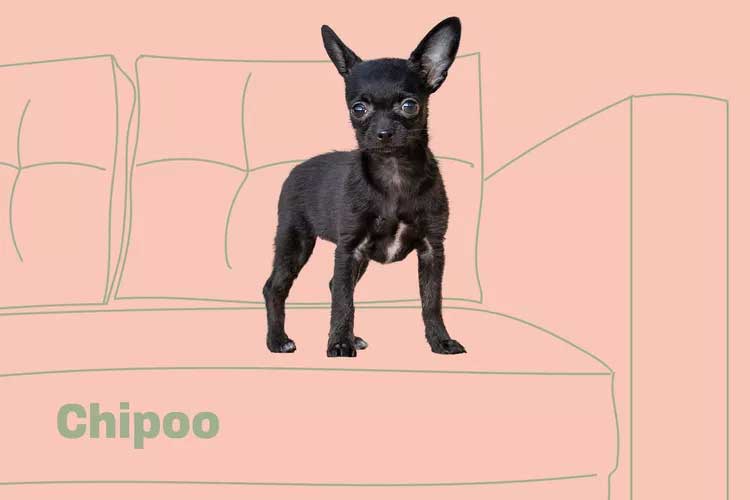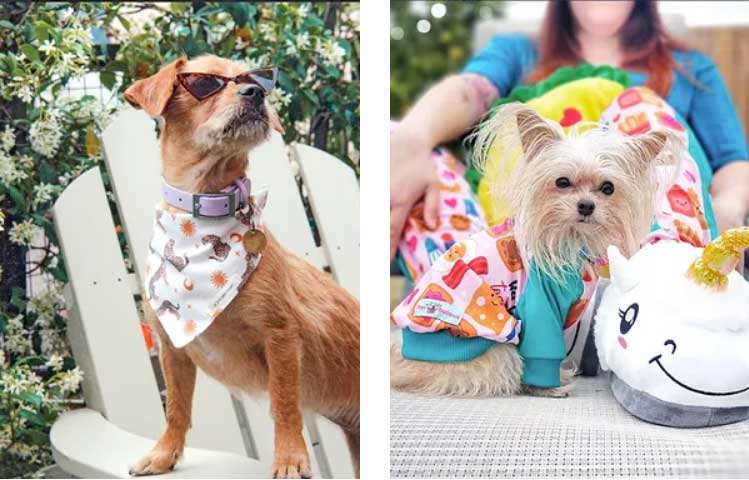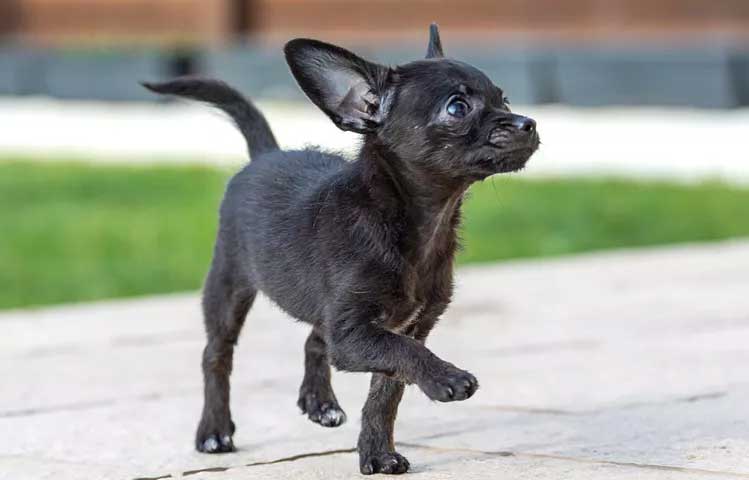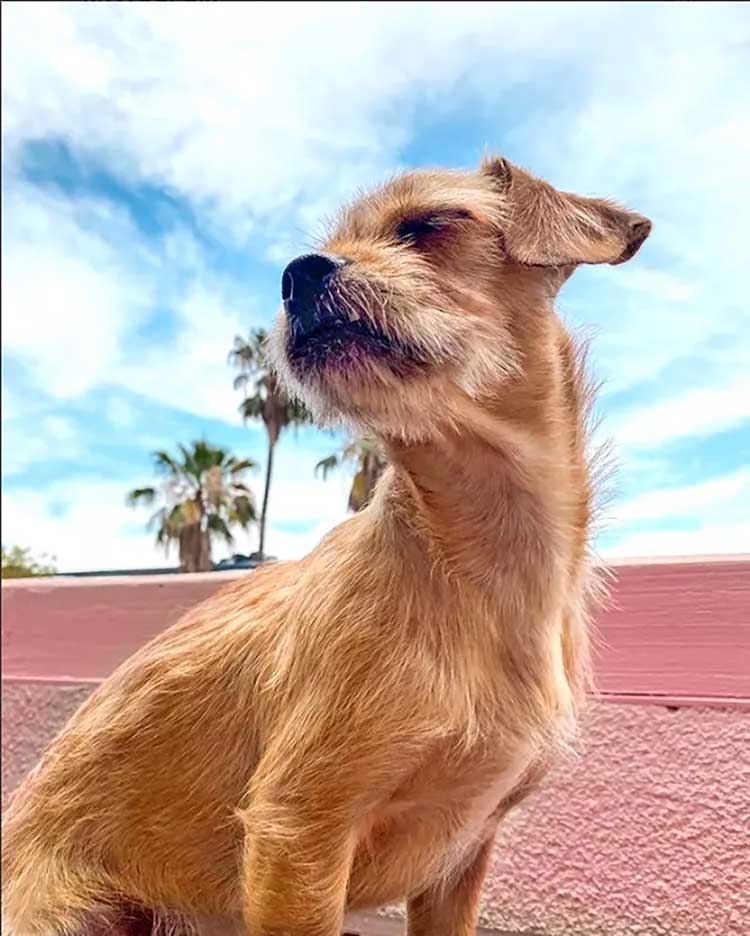
Chipoo Overview
| OFFICIAL NAME | Chipoo |
| COMMON NAME | Chipoo |
| PET HEIGHT | 5 to 15 inches |
| PET WEIGHT | 5 to 20 pounds |
| LIFESPAN | 12 to 15 years |
| GOOD WITH | cats, children, dogs, families, seniors |
| TEMPERAMENT | aloof, friendly, playful |
| INTELLIGENCE | high |
| SHEDDING AMOUNT | infrequent |
| EXERCISE NEEDS | medium |
| ENERGY LEVEL | active |
| VOCAL LEVEL | when necessary |
| DROOL AMOUNT | low |
| BREED GROUP | hybrid |
| BREED SIZE | small (0-25 lbs.) |
| COAT LENGTH | curly, medium, short |
| COLORS | black, blue, brown / chocolate / liver, cream, fawn, gold / yellow, gray, red, white |
| PATTERNS | bicolor, brindle, tricolor |
| OTHER TRAITS | apartment-friendly, easy to groom, easy to train, good for first-time pet owners, hypoallergenic, strong loyalty tendencies, tolerates being alone |
What is a Chipoo? Affectionate, playful, and adorably compact, the Chipoo is a Chihuahua and poodle mix. As a crossbreed of two dogs with vastly different looks and personalities, consistency among Chipoos is hard to come by. But in general, they're small, lively, and absolutely love being a part of the family—so long as they can still maintain a bit of independence.
Ideally, she will inherit the poodle's intelligence, trainability, and allergen-friendly coat alongside the Chihuahua's tiny size and sassy personality—all of which can make her a wonderful choice for just about any family who's ready to give her the love and attention she craves, first-time dog owners included.
Appearance
The Chipoo size is a big part of this little dog's appeal. As a crossbreed of the Chihuahua and miniature or toy poodle, it's no surprise that the adult Chipoo tends to be quite small. A full-grown Chipoo generally weighs between 5–20 pounds.
As a mixed breed, the Chipoo's appearance isn't as standardized as her purebred parent breeds; some may more closely resemble poodles while others take on a lot of Chihuahua characteristics. Most have brown eyes and a black nose, a plumed tail, feathering on their feet, and a medium-length coat. That coat, however, can be wiry, fluffy, wavy, or curly, and comes in nearly any color—or a blend of two or more hues. Often, they'll have erect ears to top off their playfully alert appearance.
As with other "poo" and "doodle" mixes, the Chipoo can be a low shedder due to her poodle parentage, which makes some Chipoos a good choice for those with allergies. However, regardless of any claims a breeder might make, you should keep in mind that no dog is truly hypoallergenic, and that's especially true with a crossbreed like this.
Temperament
With the Chipoo's small size, you might assume she'd be content as a lap dog all day, and it's true that she's likely to enjoy lots of snuggles. But this is still a spunky dog with plenty of energy, so she'll likely also enjoy following you around the house, playing with lots of toys, and barking to alert you of anything out of the ordinary.The ideal Chipoo balances an independent nature with loyalty and affection toward her family. She's often a little wary of strangers, which makes it all the more important that you use positive reinforcement techniques to work with your pup from day one so she understands that not everything unfamiliar is necessarily scary.

"A lot of small dogs have more concerns about the big bad world [than their larger counterparts]," says Kayla Fratt, dog behavior consultant at Journey Dog Training.
And it's no wonder—from down there, everything does seem pretty big! Fratt urges owners of Chipoos and other small breeds to make sure their dogs feel supported in unfamiliar situations.
"This means doing a lot of careful socializing to make sure they're comfortable and confident around new things, as well as comforting them when they're scared," she says. "They're likely to be scared of lots of things, like buses or dogs. Support them by picking them up, telling them they're OK, and not laughing at them. If they're barking at another dog, it's not because she thinks he's a big dog. It's because she's scared."
However, just as we saw with the Chipoo's appearance, consistency in temperament is hardly a guarantee, says Fratt.
"Whenever you mix two breeds, especially those that are very different, the variability can be all over the place," she says. So, while the hope is that you'll end up with a dog who exhibits the poodle's coat with the Chihuahua's spunk, Fratt says, "it's just as likely you'll get the Chihuahua's shedding coat and nerves, but maybe still get the poodle's braininess, which will make them overthink everything."
Still, regardless of whether your Chipoo lands near the poodle end of the spectrum or is closer to her Chihuahua roots, early socialization and reward-based training will help you make sure your pooch's most desirable traits are being encouraged—and that any less-desirable personality quirks, like being overly fearful, are not.
Living Needs
Apartments and small spaces are no problem for the mini but mighty Chipoo, but be aware that her independent nature, paired with moderate to high energy levels, means she won't hesitate to turn just about any space into her playroom. Translation: In addition to a nice walk or two each day, it's wise to make sure your dog has plenty of toys to play with, too, or she might turn some of your favorite household objects into playthings."One of the things that's delightful about small dogs is the number of things you can do with them, including playing indoors," Fratt says. "Both Chihuahuas and poodles tend to be pretty playful, so that's something you're likely to see in this mix." When it comes to taking these pint-sized puppers to off-leash dog parks, though, Fratt suggests sticking to those with a dedicated small dog section. Otherwise, she says, they could easily be injured by a playful dog several times their size.
The Chipoo can be an excellent fit for all kinds of pet parents, from first-timers and boisterous families to single seniors and experienced owners, just so long as any children in the home are old enough to handle her with care. You may need to work with your pup, too, to teach her where it's safe to play.

Kris Tirado, owner of a Chipoo named Milo, says her pup "tries to be adventurous and jump from higher places, but small dogs tend to get problems with their knees, so we have to be mindful."
Careful introductions with other household pets will help to create a peaceable kingdom, and if you have large dogs, be sure to supervise their play—it's not only children who need to be able to play safely with these little pups.
Interestingly, although both parent breeds tend not to love being left alone, the Chipoo tends to handle a little quality solo time just fine, especially if she's already had some solid playtime—or has a pile of toys to keep her company while you're out.
Care
Keeping your Chipoo happy, healthy, and super duper cute isn't too tough a task. Chipoo grooming involves brushing her a couple of times a week to keep tangles and mats at bay, bathing her every couple of months (or more often, if she likes to play in the mud), and giving her a good trim every few months. With her poodle genes, her coat has a decent chance of being a low-shedding, allergen-friendly one, but if it's more along the lines of a typical Chihuahua coat, expect some shedding.
As with all dogs, keep her nails trimmed, her ears clean, and brush her teeth often (as small dogs tend to be susceptible to dental disease).
When it comes to exercise and activity, aim for consistency over intensity. These little dogs tend to be both playful and intelligent, so starting positive reinforcement training the day you bring your puppy home is a fantastic way to bond with your furry friend while teaching her good manners. Socialization that incorporates lots of people, dogs, and new experiences is particularly important to keep her from viewing everything unfamiliar as something scary. Keep in mind that small dogs have small bladders and potty training may be something you work on for a while.
Health
With a long lifespan of 12–15 years or more, the Chipoo hybrid is a furry friend who could be by your side for many years. However, mixes like this do have the possibility of inheriting genetic diseases and predispositions from both branches of the family tree, so pet parents should be aware of all the potential issues that poodles and Chihuahuas face."The most common health disorders I find in poodle mixes tend to be Addison's disease," says Yui Shapard, BVM&S, MRCVS, educational director for the Association of Asian Veterinary Medical Professionals. When it comes to Chihuahua mixes, she says, they "they tend to be a smaller mixed breed and [we] commonly find dental disease, particularly if mixed with another toy breed prone to dental disease; patellar luxations; and ocular abnormalities." That means you should be aware of the potential for eye issues, knee issues, and, in the case of Addison's disease, vague but concerning signs like lethargy and poor weight gain.

If you're getting your pup from a breeder, Fratt strongly suggests holding Chipoo breeders to the same standards that you'd hold any other breeder to.
"You still want to ensure that parents are health tested and the breeder is doing due diligence in looking at the parents—and that doesn't just mean being checked over by the veterinarian," she says. "They should be doing x-rays and genetic panels, just like breeders do with a purebred dog."
History
Since the 1970s, breeders in the United States have been intentionally breeding poodles and Chihuahuas, although there's little doubt that unplanned Chipoos have been around for much, much longer. And so, while a Chipoo breeder should be able to provide all kinds of health records for the parents of any Chipoo puppies they're selling, it's entirely possible you'll find a Chipoo—or small, spunky dog similar to this mix—in a shelter.The sad truth about hybrid breeds like the Chipoo is that plenty of research is necessary to avoid unscrupulous breeders seeking to take advantage of a designer mix's rise in popularity. Puppy mills are abundant in the hybrid dog market, and the dogs coming from them are raised in inhumane conditions without the regard to their health, well-being, and socialization that a responsible breeder would provide.
Make sure you don't fall for a puppy mill scheme by keeping an eye out for these red flags as you're on the lookout for your new best furry friend:
There are multiple mixed breeds for sale from the same breeder.
The website offers wait times for puppies.
The breeder offers to ship puppies.
It's difficult to identify breeder contact information (no phone number, contact email, etc.).
Fun Facts
The Chipoo goes by a number of other names, each more giggle-inducing than the last: Choodle, Chipoodle, Poochi, and Poohuahua.Because they're a crossbreed, you won't find the Chipoo on the American Kennel Club's list of dogs, but they are recognized by the American Canine Hybrid Club, where they're known as Chi-Poos.
Fans of the Instagram account @HotSeniorPups might recognize Lamb Dog Stan, an 18-year-old rescued Chipoo who delights followers with his adventures alongside another elderly rescue pup named George Clooney.